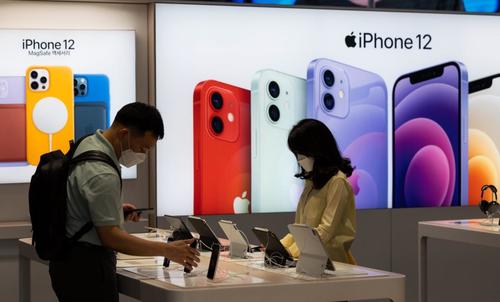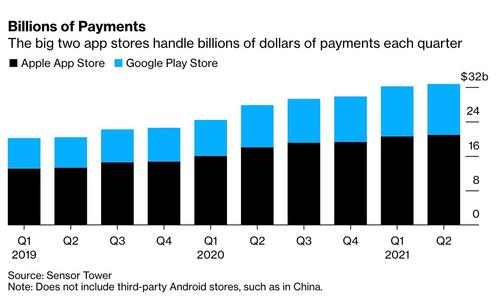South Korea Bans App Store Payment Monopolies In Latest Blow To Google, Apple
South Korea just made history in the global battle to combat the monopolistic tendencies of American tech giants by becoming the first country to force Google and Apple to allow other payments processors into their app stores.
According to Bloomberg, the new law “sets a potentially radical precedent for their lucrative operations everywhere from India to the US.”
Lawmakers in South Korea’s National Assembly passed amendments to the country’s Telecommunications Business Act on Tuesday requiring app-store owners like Google and Apple to give developers a free choice of payment providers, opening the door for developers like Epic Games to collect payments directly from customers.
The right to collect in-app payments is at the root of legal battles in the US and in other jurisdictions. The most notable example is perhaps the Epic Games vs. Apple legal battle that captivated the Silicon Valley press corp a few months back. We’re still waiting for the judge in that case to issue a ruling.
Whatever the American judge decides, the new law in South Korea will likely eat into Apple’s and Google’s profits for the Asian nation, which admittedly makes up a tiny sliver of their overall earnings. The bill will become a law when it’s signed by South Korea President Moon Jae-in, whose party supported the legislation.
Korean lawmakers made their move ahead of plans by Google to introduce its 30% commission fee in October, reversing a years-long exemption for South Korea. The company’s announcement last year that it would make its payment system mandatory for non-gaming apps was widely seen as the trigger for the new legislation, which has been dubbed the “anti-Google law” by the South Korean law.
But the new law could be a harbinger of similar restrictions in parts of the world, as the EU, the US and China all look to rein in powers of their biggest tech companies.
The EU and China have also sought to rein in the power of tech giants (American tech giants, for Europe, and domestic giants, for China). China has accomplished this via a series of unilateral crackdowns and regulatory changes, while the EU’s anti-trust chief Margrethe Vestager has brought a series of lawsuits and fines.
Source: Bloomberg
The Korea Internet Corporations Association, an industry lobby group that includes South Korea’s largest internet companies including search and online shopping giant Naver, praised the passage of the bill, which it said would help promote healthier competition.
“We hope that the passing of the bill will ensure that the rights of (app) creators and developers are protected and create a fair ecosystem in apps where users will be provided a wider variety of content at cheaper prices,” it said in a statement.
Meanwhile, Apple continued to insist that the new payment rules will erode safety protections for users, leading to a decline in trust in App Store purchases, and ultimately, fewer earning opportunities for developers in Korea.
“The Telecommunications Business Act will put users who purchase digital goods from other sources at risk of fraud, undermine their privacy protections, make it difficult to manage their purchases, and features like “Ask to Buy” and Parental Controls will become less effective,” an Apple spokesperson said.
Finally, Bloomberg explains that the new law will have far-reaching effects. The ramifications extend beyond just the $142 billion world of apps. The confrontation strikes at the fundamental role played not only by Apple and Google but also Amazon.com and Facebook as the new gatekeepers of the digital economy. Over a decade, all four companies have built up vast online marketplaces on which their rivals do business.
Tyler Durden
Tue, 08/31/2021 – 12:00
via ZeroHedge News https://ift.tt/3DwvCoR Tyler Durden

